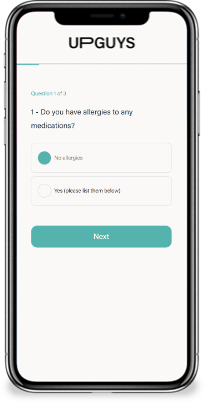

Order Sildenafil Online, Easy and Discreet
You can easily submit your order to get Sildenafil online through UPGUYS. No more wait -times to see a doctor. No more awkward encounters at the pharmacies. Submit your order today, and a Canadian physician will be in touch with you in no time.
* It is required that a doctor consult you online for prescription drugs. The doctor will determine if the medication is appropriate to prescribe.
Would you like to get Sildenafil (generic Viagra), but don’t want to see a doctor and go to a pharmacy in person?
Talk to a doctor over the phone, get your medication prescribed online today and delivered to your door in two days. Doctor visits and express shipments are free of charge
Select | $44 for 4 Tablets** The price shown here is the total to pay for 4 tablets of sildenafil 50 mg excluding the pharmacy dispensing fee. Other dosages and quantities are priced differently. This medication is only available by prescription after a medical consultation to ensure the right fit for the user.

5.0
2054 reviews
4 Quick Steps To A Better You
Fill out the questionnaire

Connect with a practitioner

Learn more about the products

Receive your delivery

Why Upguys?
We believe there’s no reason to slow down when you can take a step up and get more from your life and from your body.
-
Medical consultation
-
Online
support -
Free discreet delivery
Contact your UPGUYS health provider today.

Contact your UPGUYS health provider today.

Ordering Frequently Asked Questions
- How can I order Sildenafil on UPGUYS?
Simply open up an account here, answer a few questions regarding your allergies, and fill in your address. UPGUYS will connect you with a licenced physician that helps you get the product that fits your situation best and get a prescription. After that, the product will be sent to you.
- Do I need a prescription?
Yes, you need a prescription for ordering Sildenafil. UPGUYS offers you medical consultation and online prescriptions, making the ordering process easier.
- Does UPGUYS deliver to my region?
UPGUYS delivers your orders all over Canada.
- How long does it take for my order to be delivered to me?
You will receive your order in three to five business days.












 Sildenafil (Generic Viagra)
Sildenafil (Generic Viagra)
 Vardenafil (Generic Levitra)
Vardenafil (Generic Levitra)
 Tadalafil (Generic Cialis)
Tadalafil (Generic Cialis)

